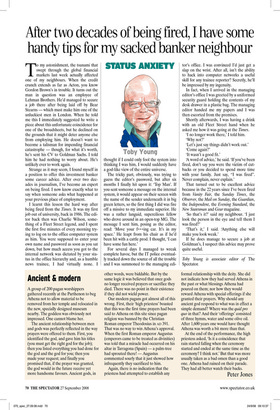After two decades of being fired, I have some handy tips for my sacked banker neighbour
To my astonishment, the tsunami that swept through the global financial markets last week actually affected one of my neighbours. When the credit crunch extends as far as Acton, you know Gordon Brown’s in trouble. It turns out the man in question was an employee of Lehman Brothers. He’d managed to secure a job there after being laid off by Bear Stearns — which must make him one of the unluckiest men in London. When he told me this I immediately suggested he write a piece about this unfortunate coincidence for one of the broadsheets, but he declined on the grounds that it might deter anyone else from employing him. He doesn’t want to become a talisman for impending financial catastrophe — though, for what it’s worth, he’s sent his CV to Goldman Sachs. I told him he had nothing to worry about. He’s unlikely ever to work again.
Strange as it may seem, I found myself in a position to offer this investment banker some career advice. After over two decades in journalism, I’ve become an expert on being fired. I now know exactly what to say when someone asks what happened at your previous place of employment.
I learnt this lesson the hard way after being fired from the Times. It was my first job out of university, back in 1986. The editor back then was Charlie Wilson, something of a Fleet Street legend, and I spent the first five minutes of every morning trying to log on to the office computer system as him. You were supposed to enter your own name and password as soon as you sat down, but how much access you got to the internal network was dictated by your status in the office hierarchy and, as a humble news trainee, I had virtually none. I thought if I could only fool the system into thinking I was him, I would suddenly have a god-like view of the entire universe.
The tricky part, obviously, was trying to guess the editor’s password, but after six months I finally hit upon it: ‘Top Man’. If you sent someone a message on the internal system, it would appear on their screen with the name of the sender underneath it in big green letters, so the first thing I did was fire off a missive to my immediate superior. He was a rather languid, supercilious fellow who drove around in an open-top MG. The message I sent him, posing as the editor, read: ‘Move your f***ing car. It’s in my space.’ He leapt from his chair as if he’d been hit with a cattle prod. I thought, ‘I can have some fun here.’ For several days I managed to wreak complete havoc, but the IT police eventually tracked down the source of all the trouble and I was summoned to the managing edi tor’s office. I was convinced I’d just get a slap on the wrist. After all, isn’t the ability to hack into computer networks a useful skill for any trainee reporter? Secretly, he’ll be impressed by my ingenuity.
In fact, when I arrived in the managing editor’s office I was greeted by a uniformed security guard holding the contents of my desk drawer in a plastic bag. The managing editor handed me my papers and I was then escorted from the premises.
Shortly afterwards, I was having a drink with an old Fleet Street hand when he asked me how it was going at the Times.
‘I no longer work there,’ I told him.
‘Why not?’ ‘Let’s just say things didn’t work out.’ ‘Come again?’ ‘It wasn’t a good fit.’ ‘A word of advice,’ he said. ‘If you’ve been fired, don’t say you were the victim of cutbacks or you decided to spend more time with your family. Just say, “I was fired”. Never complain, never explain.’ That turned out to be excellent advice because in the 22 years since I’ve been fired from Vanity Fair, the Sunday Times, the Observer, the Mail on Sunday, the Guardian, the Independent, the Evening Standard, the New Statesman and Gear magazine.
‘So that’s it?’ said my neighbour. ‘I just look the person in the eye and tell them I was fired?’ ‘That’s it,’ I said. ‘Anything else will make you look weak.’ If he does manage to secure a job at Goldman’s, I suspect this advice may prove quite useful.
Toby Young is associate editor of The Spectator.










































































 Previous page
Previous page